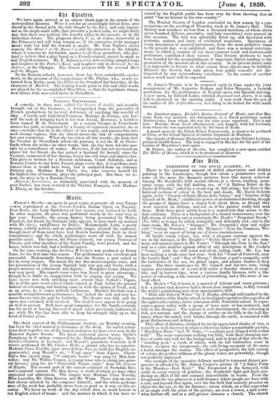The third concert of the Philharmonic Society, on Monday evening,
has been the chief musical performance of the week. Its varied attrac- tions drew together one of the largest audiences we have ever seen in the Hanover Square Rooms. The great orchestral pieces were, Spohr's Symphony in D minor, composed for the Philharmonic Society ; Beet- hoven's Overture to Leonora; and Mozart's pianoforte Concerto in D Tainor, performed by Mr. Charles Halle, a pianist who has no superior. Madame Clara Novello, (just arrived from Nice to fulfil her English en- gagements,) sang Mozart's air, " Porgi amor " from Figaro. Chem- Mni's fine sacred song, "0 salutaris hostia" was sung by Miss Las- cellos; and Mr. Wilbye Cooper, (a young tenor who is rising into gene- ral favour,) sang the air "Distressful Nature sinks" from The Seasons of Haydn. The second part of the concert consisted of Sterndale Ben- nett's pastoral cantata The May Queen, a work of which we have often expressed our admiration. The singers were Madame Clara Novell°, Miss Lascelles, Mr. Sims Reeves, and Mr. Weiss. There was an excel- lent chorus selected by the composer himself; and the whole perform- ance of the work has probably never been so good as it was on this oc- casion. We know no work of the day which does so much honour to our English school of music : and the manner in which it has been re- ceived by the English public has been very far from showing that an artist "has no honour in his own country."
The Musical Society of London concluded its first season by a con- versazione on the evening of Thursday week at St. James's Hall. This Society now numbers no less than a thousand members, of whom above seven hundred (fellows, associates, and lady associates,) were present on this occasion. The hall was splendidly fitted up, and decorated with portraits, statues, and busts of celebrated musicians. Specimens of every description of musical instrument, from the most primitive times to the present day, were exhibited; and there was a musical entertain- ment, to which a number of our most eminent vocal and instrumental performers contributed their talents. This Society professes to have been founded for the accomplishment of important objects tending to the promotion of the musical art in this country. In its present infant state it is impossible to foresee to what extent those objects may be flailed. Hitherto the Society has only given four public concerts not dis- tinguished by any extraordinary excellence. In the course of another season much more will be expected.


























 Previous page
Previous page